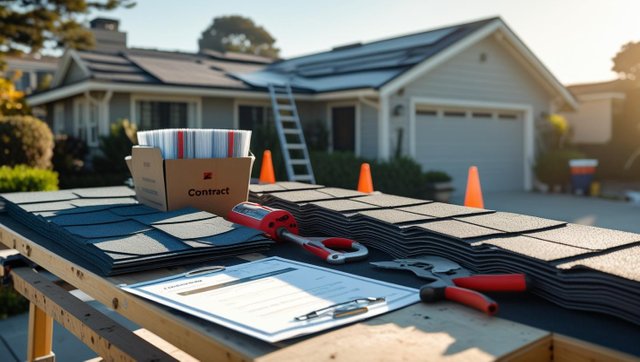How to Choose the Right Roofing Contractor in the Bay Area
Roofing is one of the most expensive investments you’ll make in your property. Whether you own a single-family home in Fremont, a retail center in Concord, or a warehouse in Hayward, choosing the right contractor means the difference between a roof that lasts and one that leaks.
This article explains how to vet a roofing contractor for residential, commercial, and industrial projects in the Greater Bay Area.
Why Your Roofing Contractor Matters
A new roof is only as good as the people who install it. Even high-end materials fail early if applied poorly. Roof repairs done wrong cause repeat damage, legal disputes, and insurance issues.
Hiring a licensed and experienced local contractor ensures:
Your roof meets California code
Materials are installed correctly
Warranties stay valid
Permits and inspections happen on time
You get long-term support if problems arise
Contractors like Winter Roofing Inc. bring all of that to the table, with experience across residential, commercial, and industrial sectors.
Step 1: Confirm License and Insurance
Start with the basics.
Ask for:
California contractor license number (verify at cslb.ca.gov)
General liability insurance
Workers’ compensation insurance
Roofing classification (C-39 license)
You’re liable if a worker is injured and the contractor lacks proper coverage. Don’t take the risk.
Step 2: Check Local Experience
The Bay Area has a mix of roofing types, climates, and jurisdictions. Look for a contractor who has worked in your area, not just in California generally.
Questions to ask:
Have you done projects in this city or county?
Are you familiar with local codes and permitting offices?
Have you worked on similar properties or roof types?
Companies like Winter Roofing Inc. operate throughout the region and have handled everything from small shingle replacements to large-scale commercial re-roofs.
Step 3: Get Multiple Bids
Don’t accept the first estimate. Compare at least three bids from licensed contractors.
Compare:
Scope of work
Total cost, including disposal and labor
Material brands and warranties
Timeline and work hours
Payment schedule
Permit handling
Be wary of bids that seem low without explanation. Underbidding often leads to poor materials, change orders, or rushed labor.
Step 4: Ask About Materials and Warranties
Not all roofing materials are the same. Ask what they recommend for your building, and why.
Ask for:
Manufacturer name and product line
Warranty terms (material and labor)
Projected lifespan
Energy efficiency or cool roof compliance (Title 24)
Fire ratings, especially for areas near wildland zones
A reputable contractor like Winter Roofing Inc. will recommend materials based on performance, not profit margin.
Step 5: Understand the Timeline
Delays increase costs and disrupt schedules. Know what to expect before signing.
Get clear answers on:
Start and finish dates
Crew size and daily work hours
How weather delays will be handled
What access the crew needs (parking, gates, restrooms)
Whether you need to vacate the property
Industrial and commercial jobs may need weekend or after-hours work. Ask about flexible scheduling.
Step 6: Review the Contract Carefully
Your contract should protect both parties.
It must include:
Full scope of work
Total cost and payment terms
Material details
Timeline with penalties or bonuses
Clean-up and disposal terms
Warranty details
Licensing and insurance confirmation
Avoid contractors who use vague or verbal-only agreements. Everything should be in writing.
Step 7: Check References and Reviews
Online reviews matter, but direct references are better.
Ask for:
2–3 recent client references
Photos of completed work
Case studies for similar property types
Then follow up. Ask the reference about communication, timeline, quality, and whether they’d hire the company again.
Contractors like Winter Roofing Inc. are Diamond Certified, which means they pass a rigorous independent customer satisfaction audit.
Step 8: Know What’s Included (and What’s Not)
Surprises cost money. Make sure your estimate includes:
Tear-off and disposal of old roofing
Repairs to decking or substrate if needed
Permit costs and city inspections
Site protection and cleanup
Equipment rental fees (e.g., lifts, dumpsters)
Ask what happens if hidden damage is found. Will they pause for your approval? How will that be billed?
Step 9: Understand the Cleanup Plan
Roofing is messy. Good contractors handle cleanup daily and leave your property better than they found it.
Expect:
Magnet sweeps for nails and fasteners
Tarping and protection of plants and siding
Dumpster or trailer removal
Final walkthrough and punch list
If you’re managing a commercial or industrial site, ask about safety barriers and OSHA compliance during active work hours.
Step 10: Plan for Long-Term Support
A good contractor is still available years after installation.
Ask:
How do I request warranty service?
Do you offer annual maintenance plans?
Can I add solar or HVAC equipment later without voiding the roof warranty?
Who should I contact for future upgrades?
Reliable companies document your job and return for follow-up repairs or inspections.
